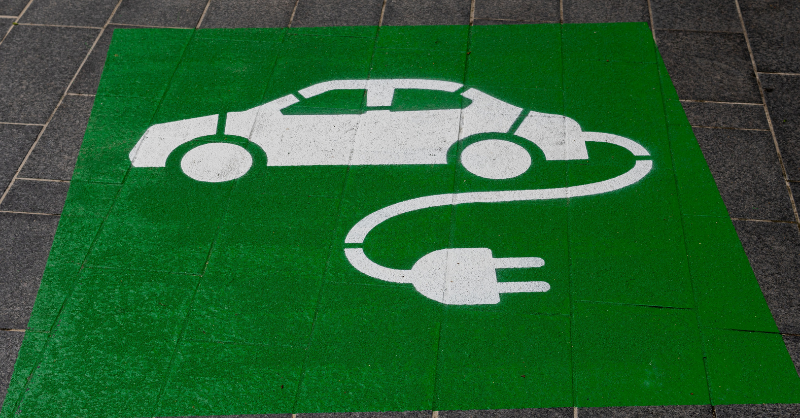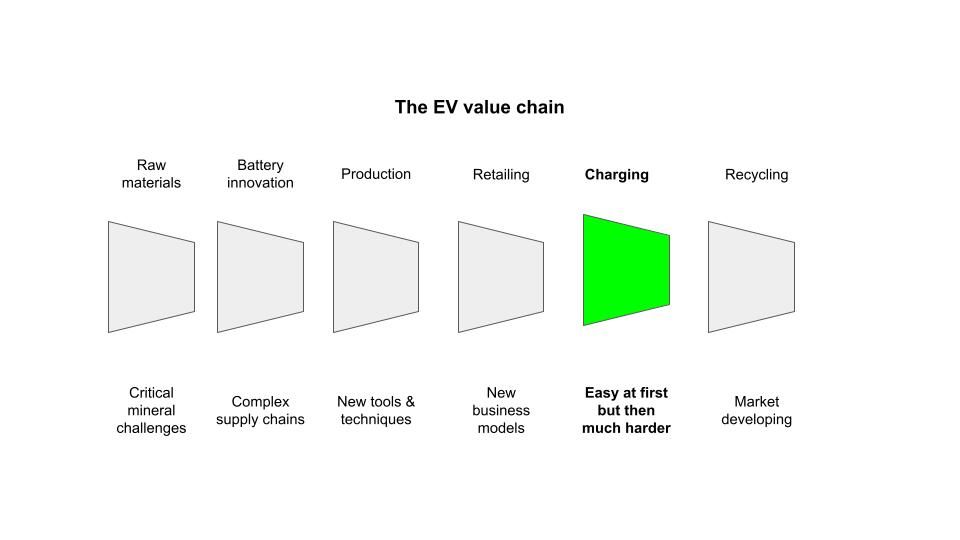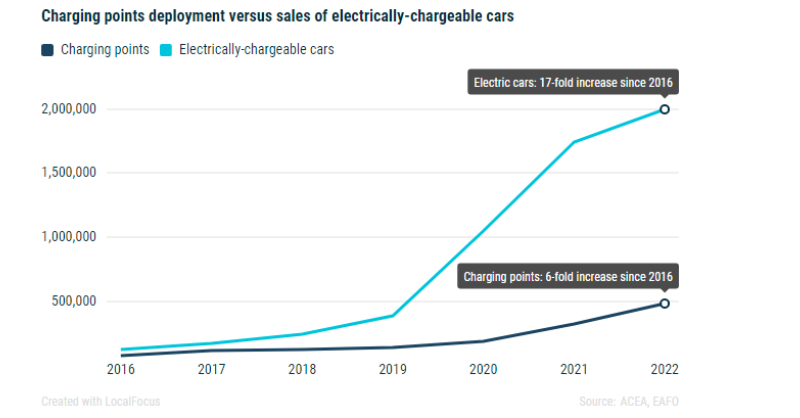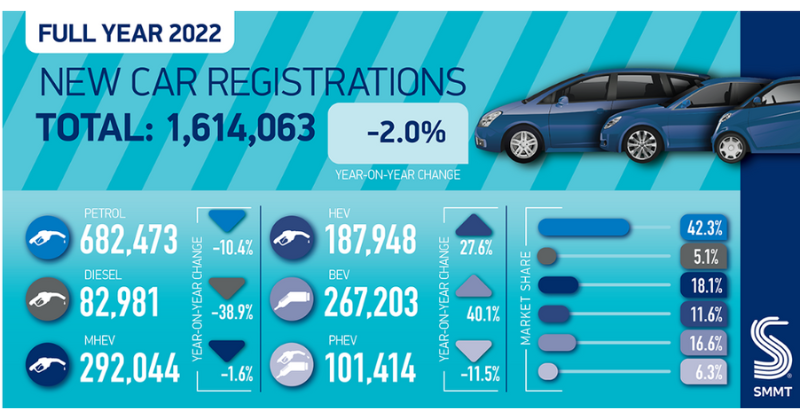
Do we have enough EV chargers?
We are going to need a lot more EV chargers, including solutions that work for all potential purchasers, including those in dense urban areas. Yes, EV charging growth is lagging the surge in EV's - but that's not a problem (yet).
Summary: We are going to need a lot more EV chargers, including solutions that work for all potential purchasers, including those in dense urban areas. Yes, EV charging growth is lagging the surge in EV's - but that's not a problem (yet).
Why this is important: If consumers are going to buy EV's, they need to have somewhere to charge them. We know that many people will charge at home and at work. But what about those that don't (or cannot) ? How big a group are they, and how soon do we expect them to switch to EV's?
The big theme: According to Our World in Data, Transport accounts for 24% of energy related emissions and 16% of total emissions, of which nearly half (45%) is from passenger transport. The Transition in Transport is one of the most advanced, but as the industry moves up the innovation S curve from early adopters through to the mass market, there will be numerous new challenges.

The details
Summary of a report from the ACEA
In 2022, the market share of Battery Electric vehicles (BEVs) expanded to 12.1%, a 3.0-percentage-point improvement compared to 2021. This confirms the trend over the last six years, with BEV sales increasing 17-fold between 2016 and 2022. However, the pace of infrastructure roll-out is lagging way behind consumer demand for electrically-chargeable cars. The number of public chargers in the EU grew by less than six times between 2016 and 2022. This means that the sales of electric cars have been growing almost three times faster than the build-up of charging points.
Why this is important
One of the biggest is that will limit the long term sale of EV's is EV charging - creating a solution that works for all potential purchasers. Timing here is key. The first solution needed is for the 50-75% of potential purchasers who can charge at home or at work. But, for EV’s to totally replace fossil fuel cars, we pretty quickly need to work out how people can charge in dense urban areas.

According to the European Automobile Manufacturers’ Association (ACEA) the public EV charging network is lagging behind, and by implication, acting as a drag on future EV sales. But is that correct? Are we looking at the wrong metric? Rather than thinking of primarily about petrol station replacements, should we be concentrating instead on at work charging? That was the subject of a 2022 report for the Transport & Environment NGO - but before looking at the findings lets set out the context.

It's all too easy to disappear into the EV problem rabbit hole. You know the one - EV’s are great but …. what about the upfront cost, where do I charge and where will all the battery raw materials come from? These are clearly issues we need to be aware of (and solve) - but we need to remember we are still on the early stages of the S shaped innovation curve. We should expect more changes. Some of this will be about innovation, such as new battery chemistries, but the other big differences will be about how we use this new technology. Despite appearances EV’s are not the same as our traditional fossil fuel powered cars.
EV charging is one such difference. Much of what we read seems to assume that we will refuel our EV’s in a similar way to how we currently fill up our petrol or diesel cars - at home overnight plus at a facility (a renamed petrol station), appropriately spaced along our main roads and around our cities. But, is this right? Instead, will we use a top up approach, when we stop for our shopping or at work ? Will public fast chargers just be for the occasional long trip, and as a way of reassuring the reluctant EV switcher, that charging on the go will be fine. Remember, most car journeys are short, well within the capacity of a full charge for most EV batteries. If this scenario is correct, we will need many more chargers, but in very different locations.
Let's look a bit more deeply. Electric vehicles have been one of the sustainability transitions success stories. As the ACEA blog highlights, in Europe, sales of electrically chargeable vehicles have risen 17x since 2016. And there is little sign that this growth is slowing. 2022 sales of battery electric vehicles (BEVs) across Europe (EU +EFTA +UK) grew 29% to 1.5m vehicles - equating to a 12.1% market share. Together BEV’s plus plug-in hybrids plus hybrid electrics, made up 44% of passenger vehicle sales.
We seem to be well on our way to an electrified transport system within the next decade or so. So - should we be worried about the chart above, which seems to show just how far behind Europe is in installing charging points? Will this cause the EV sales trend to flatten? Actually, from where we sit it's probably less of an issue than many people seem to think.
A quick recap on the reasons people give for NOT buying an EV. According to the 2022 EY mobility consumer index study:
"Consumers are becoming more comfortable with the EVs themselves, but charging infrastructure remains a barrier. Access to, and speed of, charging is emerging as the key inhibitor for would-be buyers, as other established concerns over high initial costs and range anxiety show evidence of subsiding".
This seems to suggest that the absence of public charging, that is easy to use and fast, is now the biggest barrier to EV sales growing further.
But what if we are not counting the number of charging points correctly. What if we actually have way more charging points than we think. And what if most of these “uncounted” chargers are actually where we need them, at work? Let's have a look at the UK, which is a mid market country in terms of EV sales at c.16.6% market share for BEV new registrations, rising to 22.9% if you also include plug in hybrids (both 2022)

How many chargers does the UK have? According to Zap-map, there are now (to end Feb 2023) c. 690,000 battery-electric cars in the UK, served by c.38,982 public charging points. So roughly 17 BEV cars per public charger - somewhat behind the the International Energy Association (IEA) recommended European level of 10 EVs to 1 charging connection. Obviously this excludes home chargers, which is where most charging currently takes place. And on this it's worth remembering that approximately three-quarters of UK drivers, (around 16m homes), have off street parking. So, most drivers can charge at home.
But let's look at some other interesting statistics. According to a recent report for the Transport & Environment NGO, 22m vehicles are regularly used for commuting and just over ⅓ of all car and van miles were for commuting and business purposes. This suggests workplace charging is likely to be the second biggest market, after at home.
And this is idea is borne out by analysis. According to the report, it is estimated that there are between 27,000 and 43,000 workplace charging points in the UK. Just as a reminder, this compares with c.38,982 public charging points, so at the midpoint of the estimate, there are as many at work chargers as there are public ones. And public + work comes to more than 1 charger per 10 EV’s, in line with the IEA recommendation.
Before we celebrate too much, the report also highlights a challenge:
""In the majority of permutations the cost savings of operating electric fleets as opposed to diesel is sufficient to not only overcome the additional vehicle cost, but also to pay for the charging infrastructure. On the other hand, the business case for staff and visitor charging is poor and does not break even in most scenarios."
So still work to do, but not an unsolvable challenge.
Something a little more bespoke?
Get in touch if there is a particular topic you would like us to write on. Just for you.
Contact us
Please read: important legal stuff.

